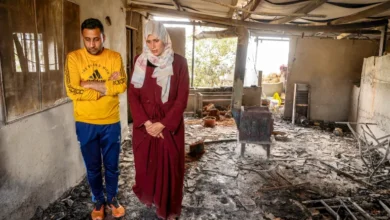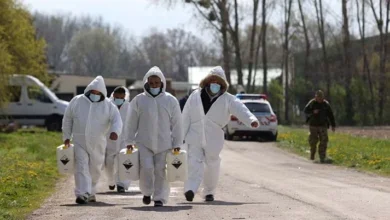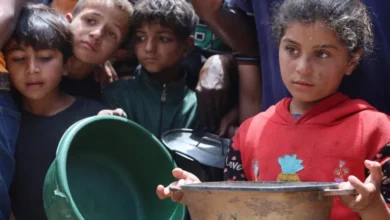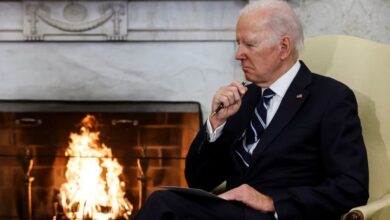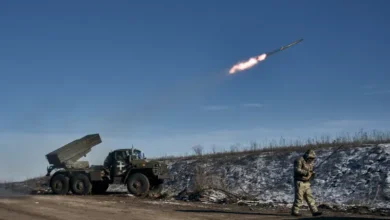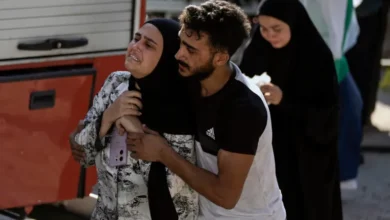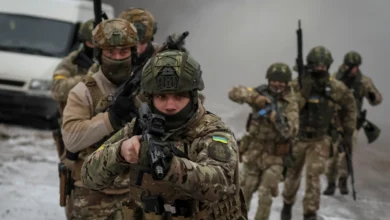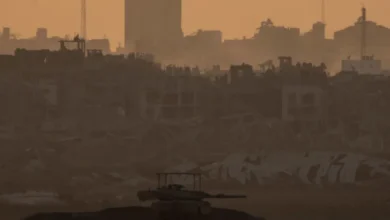In Jerusalem’s Old City, Israeli ‘siege’ forces Palestinian shops to close
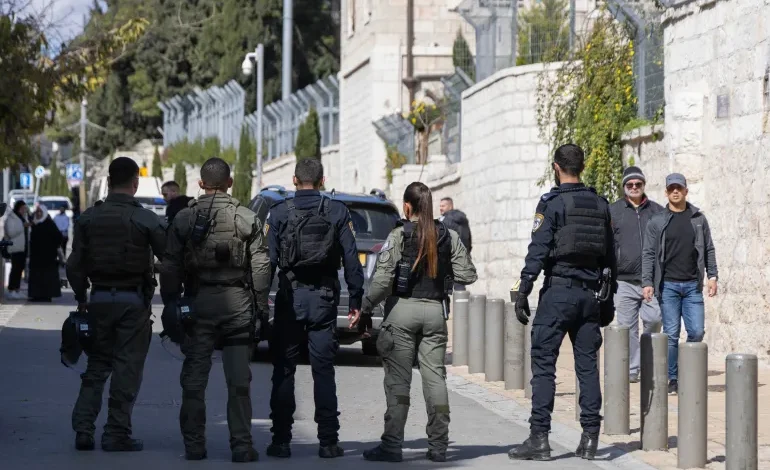
On a corner just outside one of the gates to the Al-Aqsa Mosque Compound in the Old City of Jerusalem, 30-year-old Abu Mohammad was standing amid the smell of spices, dried fruit and herbs wafting through his decades-old store.
“I’ve been here all my life. My grandfather worked in spices in the Old City of Jerusalem his entire life as well,” the father of three told Al Jazeera.
Before the onset of Israel’s war on the besieged Gaza Strip less than 80km (50 miles) away last October, Abu Mohammad would have to bring in a shipment of new produce once a week to keep the shop stocked up and meet the high demand for it. Since October 7, when the war began, he has not brought in any shipments in at all.
The Old City is not only home to the Al-Aqsa Mosque and the Dome of the Rock – one of Islam’s holiest sites – it is also the location of the Church of the Holy Sepulchre, believed by Christians to be the site where Jesus was crucified, and the Western Wall, which Jews believe to be the last remnant of the Second Temple. The Old City, therefore, normally attracts huge numbers of pilgrims and visitors from all over the world. In 2019, some five million tourists visited the country from abroad, with Jerusalem the number one destination, according to the Jerusalem-based Arab Chamber of Commerce and Industry.
Aside from its importance for tourism, the Old City and its surrounding commercial areas have historically made up the most central market for the 350,000 Palestinians living and working in Jerusalem.
But since the start of the war, during which more than 28,000 Palestinians have been killed, Israeli forces have implemented strict checks on all entrances to the Old City in what residents describe as a “siege”, with only those with registered addresses inside the Old City allowed to enter.
Large numbers of Israeli paramilitary officers are stationed at checkpoints with metal barricades at all the open gates of the Old City, and are particularly heavily deployed at the gates used mainly by Palestinians – Bab al-Amud (Damascus Gate), Bab az-Zahra (Herod’s Gate), Bab al-Asbat (Lion’s Gate) and Bab al-Jadid (New Gate).
Over the past four months, Abu Mohammad said, there has been no need for shipments of produce.
Empty streets
The charming, narrow cobblestone streets of the Old City, which once were filled with a never-ending stream of Palestinians, pilgrims and visitors, are today almost completely empty. Shouts from Palestinian vendors calling out to shoppers, as well as the elderly women selling fresh herbs on the steps of the Old City streets, have all gone.
Income from his store, Abu Mohammad said, “dropped by 99 percent during the war on Gaza”. The only people to visit his shop these days are those who live in the Old City.
“We are losing money and have been forced to throw out many of our food items because they expired,” he added.
The Old City of Jerusalem, which is located in the eastern Israeli-occupied side of the city, contains about 2,000 Palestinian-owned shops, including 450 souvenir stores, 25 restaurants and 23 supermarkets. A third of them had closed due to Israeli restrictions and high taxes prior to October 7.
Since the war, however, at least half of all Palestinian stores have now been forced to close their doors either entirely or partially, according to Louay al-Husseini, the general manager of the Arab Chamber of Commerce and Industry.
“The majority of shops depend on tourism, and there is zero tourism over the past four months,” al-Husseini told Al Jazeera.
“Most of the stores are affected – even the bakeries, and the fruit and vegetable shops – they depend on restaurants, which in turn depend on tourists,” he continued. “It is a chain of production – when one part breaks down, it all breaks down.”
‘Worst state in 40 years’
In another corner of the Old City, Tawfiq al-Halawani is still running his small shop, the shelves of which are overflowing with chocolates, as well as Arab and Turkish sweets.
While his store, like Abu Mohammad’s, is located on a major thoroughfare known as al-Wad Street which runs from Damascus Gate – the largest of the Old City gates – directly to the Al-Aqsa Mosque Compound, there are few buyers. On many days, there are none at all.
“I’ve been in this shop for 40 years. This is the longest and the worst state we’ve lived through in the Old City,” he told Al Jazeera.
“We closed our doors at the start of the war and we opened again after that, but it was useless. We would not sell, nor buy,” he continued. “For the past 130 days, some stores did not open their doors at all or sell anything.”
The Israeli checkpoints at the entrances to the Old City, he says, are “arbitrary, illogical, and there is no excuse for them”.
“They prevent people from praying in the Old City and from shopping. We are at the point of below zero – no one is buying anything while we continue to pay taxes and heavy expenses to keep our shops open,” al-Halawani said.
Many of the shop owners Al Jazeera tried to interview, including elderly men, declined to speak, fearing arrest or punishment by Israeli police.
One storeowner, who took much convincing before he spoke anonymously, told Al Jazeera: “I am a son of Jerusalem and I live in the Old City. I’m afraid to speak out because of the situation we are living in.”
He noted the rise in violence and harassment by Israeli forces, particularly against young Palestinian men, at the checkpoints set up around the Old City, a reality that has further deterred Palestinians from coming to pray or shop.
“Our sons are being beaten, assaulted, kicked – and they get spat at,” the shopkeeper said. “If you try to complain, the officer will tell you ‘So what?’, but if you look at a settler the wrong way, the police will detain us,” the man said.
“If a girl is wearing a keffiyeh, they humiliate her, grab her phone and within minutes you see them handcuffing her and taking her,” he continued.
“My friends ask me: Why do you close on Fridays? I tell them: ‘There’s no people, there are no worshippers.’
“We close our shops the majority of the week. It’s not just me – everyone. If we don’t get provoked by the settlers, then it’s the [Israeli-controlled] Jerusalem municipality, if not the municipality then it’s the police, the army,” he said. “Their hate has become very obvious since the war on Gaza.”

